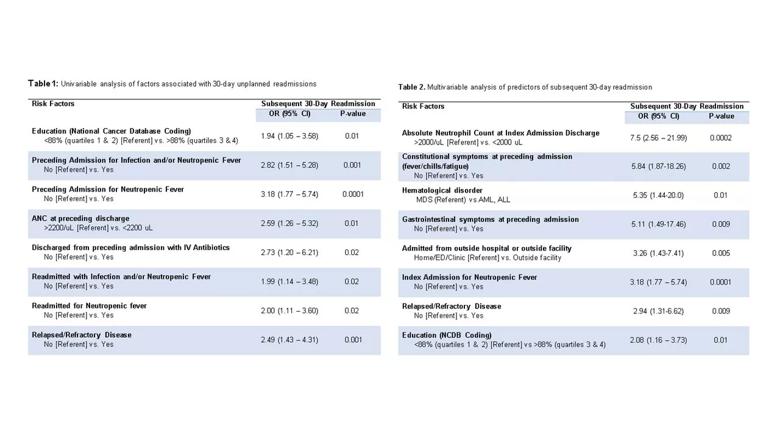Disease-related, clinical and discharge-associated factors

Patients with hematologic malignancies (HM) are at risk of recurrent 30-day unplanned readmissions (UR), given high symptom burdens and repeated courses of chemotherapy. A team of Cleveland Clinic researchers, led by Sudipto Mukherjee, MD, PhD, MPH, recently sought to identify predictors of recurrent 30-day UR in patients with HM as a first step toward designing interventions for this group. Girish Kunapareddy, MD, MBA, a fellow at Cleveland Clinic Cancer Center, was first author on the abstract.
Advertisement
Cleveland Clinic is a non-profit academic medical center. Advertising on our site helps support our mission. We do not endorse non-Cleveland Clinic products or services. Policy
The study included 259 30-day UR involving 157 hematologic malignancy patients treated at Cleveland Clinic between 2012 and 2015. Hematologic malignancies included in the analysis were acute leukemias, myelodysplastic syndromes and aggressive lymphomas. The tables below show disease-related, clinical and discharge-associated factors that are associated with 30-day UR and independently predictive of subsequent 30-day UR.

Image content: This image is available to view online.
View image online (https://assets.clevelandclinic.org/transform/0e49560a-c922-49b0-bc10-7da2daa5dc37/ash-graph_jpg)
”We found several predictors of recurrent 30-day UR, notably gastrointestinal symptoms, prior admission for febrile neutropenia, those with relapsed refractory disease and constitutional symptoms, among others,” says Dr. Mukherjee, associate staff in the Department of Hematology and Medical Oncology at Cleveland Clinic Cancer Center. “These data shed light on potential areas that can be targeted for interventions to reduce these UR, which are a significant burden on these patients and not an optimal use of medical resources.” For instance, the subset of patients with relapsed/refractory disease may particularly benefit from a specialized program that includes individualized symptom management from a coordinated team and closer ambulatory follow-ups. As part of efforts to reduce 30-day UR, Cleveland Clinic has instituted five-day follow-up for all cancer patients discharged after hospitalization.
Photo Credit: ©Russell Lee
Advertisement
Advertisement

Radiation therapy helped shrink hand nodules and improve functionality

Standard of care is linked to better outcomes, but disease recurrence and other risk factors often drive alternative approaches

Phase 1 study demonstrates immune response in three quarters of patients with triple-negative breast cancer

Multidisciplinary teams bring pathological and clinical expertise

Genetic variants exist irrespective of family history or other contributing factors

Study shows significantly reduced risk of mortality and disease complications in patients receiving GLP-1 agonists

Structured interventions enhance sleep, safety and caregiver resiliency in high-acuity units

Addressing rare disease and challenging treatment course in an active young patient